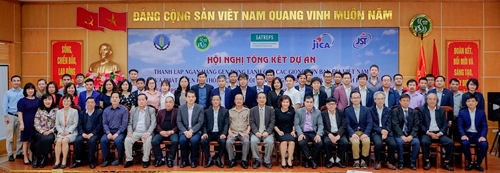March 03, 2020 | 19:26 (GMT+7)
Vietnam, Japan join hands to conserver and utilize Vietnamese pig resources
PANO - The final dissemination seminar for JICA’s SATREPS project on “Establishment of cryo-bank system for Vietnamese native pig resources and sustainable production system to conserve bio-diversity” was held on March 3 at the National Institute of Animal Science in Hanoi.
Representatives of concerned ministries, Vietnamese Government agencies and international organizations working in the fields of husbandry, conservation, assisted reproduction, and animal health, as well as Vietnamese and Japanese stakeholders of the project attended the seminar to share their experiences and outputs of the project.
At the seminar, a final summary report highlighting the achievements of the project, as well as the impacts of the project on pig production and conservation in Hoa Binh province was presented. After the project’s completion in May 2020, the Vietnamese stakeholders are committed to continuing the initiatives started by the project for conservation and utilization of important Vietnamese native pig resources.
    |
 |
|
Delegates pose for a photo. |
Within the framework of the project, which started in May 2015, joint research activities aiming at establishing a conservation system for identification, assessment and utilization of Vietnamese native pigs have been implemented.
As a result, a database with identification, classification, characterization of Vietnamese native pigs in 22 provinces and a semen cryo-banking system were established.
Basic technologies for the prevention and control of infectious diseases, improvement of feeding and raising management have been disseminated to farmers raising native pigs in Hoa Binh province in order to increase productivity.
Vietnam has a rich diversity and is blessed with a large number of livestock breeds. According to the report by the Government of Vietnam, there are more than 20 pig breeds in Vietnam. Recently, some of those breeds have drastically decreased in number and crossed with other breeds resulting in a situation where some of the native rare breeds are becoming extinct or already in extinction. In view of the widespread porcine diseases in Asia, conservation of native pig breeds is an urgent task from bio-diversity point of view, and is one of the priorities of the Government of Vietnam. Developing sustainable measures for improved livelihood of small-scale farmers is an equally important priority.
Reported by Chung Anh